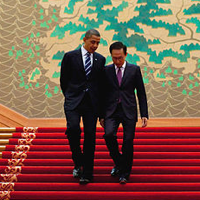In my WPR column two weeks ago, I argued that a key challenge facing U.S. policymakers in the coming decade was in defining how the U.S. “should prioritize its interests, commitments and partnerships.” A number of recent articles and reports suggest that a broad consensus is indeed emerging, and that when it comes to U.S. foreign policy priorities, all roads lead to Asia.
In his own WPR column this week, Thomas P.M. Barnett notes that “regional integration in East Asia depends on an American security presence,” a conclusion that many of the participants at a recent trilateral Korea-Japan-U.S. security dialogue co-sponsored by the Center for the National Interest, the Tokyo Foundation and the SAIS U.S.-Korea Institute would second.
In a recently released report titled “Hard Choices: Responsible Defense in an Age of Austerity,” the Center for a New American Security, a national security think tank with close links to the Obama administration's defense team, also called for the U.S. national security establishment to “focus on the Western Pacific and Indian Ocean and broaden engagements along the Pacific Rim,” while shifting to a “defensive strategy” in the Middle East. By contrast, the report's authors argue that Europe is a “tertiary concern” with Africa and Latin America receiving “the lowest priority.”

